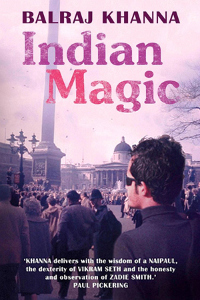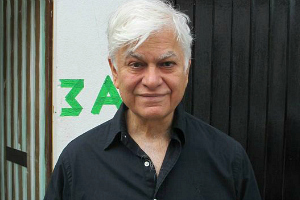Ravi Mehra arrives at Victoria Station, London from India with a work permit and five pounds in his pocket. He's young, good looking, educated and full of optimism but naïve about London life. His boundless enthusiasm for the Mother Country takes a severe drubbing when he meets reactions ranging from at best indifference to at worst open hostility. Racism is endemic, and most accommodation comes with the stark warning; No blacks. No Indian. No Irish. Jobless, homeless and starving, his luck eventually changes when he's hired as dishwasher in an Indian restaurant and stumbles upon a room to let without the usual prohibitions.
Life begins to look up as the affable Ravi finds favour with Mr Swami, owner of the Indian Magic restaurant, and is promoted to a permanent position as a waiter. He's invited into the traditional Swami household but also discovers the freedoms of 1960s London. In this typical east meets west culture clash, Ravi relishes the new; girls as eager as boys to have a good time and parties aplenty. Soon he's breaking his solemn promise to his mother to avoid the demon alcohol.
Indian Magic has elements of autobiography, as Balraj Khanna himself arrived in London in 1962 to continue his studies in English Literature at Oxford University. Due to the turmoil in India caused by the war with China, papers from his university never arrived and he was unable to resume studying. But he didn't let this defeat him, instead becoming a foreign correspondent, painter and author of both fiction and non-fiction.
This novel is full of insights into the immigrant experience in 1960s London. There are plenty of humorous moments, with enjoyable banter and rivalries between the restaurant staff and plenty of misunderstandings with the Swamis, who want to bend Ravi to their will. The traditional Indian dishes prepared in their home (but not in the restaurant where English people only want to eat generic 'curry') by Mrs Swami and her extended family sound mouth-watering, but the occasions on which they are served often descend into farce.
Racism is not a preserve of white people. Ravi's room is in a house in the Finchley Road affectionately known as the Subcontinental or Sub, and while Ravi makes lasting friendships:
Where my friends were concerned, their Sub was an island in the vast ocean of loneliness. Home politics were never discussed, though we sometimes said to each other that if Indians and Pakistanis could live happily together here, why couldn't they back home? The irony of it was not lost on us. We had to travel five thousand miles to find out.Ravi becomes embroiled in danger as a result of dating Jane, a white English girl, against the wishes of her violent and abusive father, but these darker episodes are not fully explored and, even when his life is threatened, it never really feels as though things will end too badly for him. Indian Magic reads like an intriguing romantic comedy and indeed would make a great film in this genre. You suspect that everything is going to turn out alright in the end, but it's no less enjoyable and engaging an experience for that.
Thanks to Hope Road Publishing for my review copy. Photos courtesy of desiblitz.com


No comments:
Post a Comment
I'd love to hear what you think! Please let me know in the box below